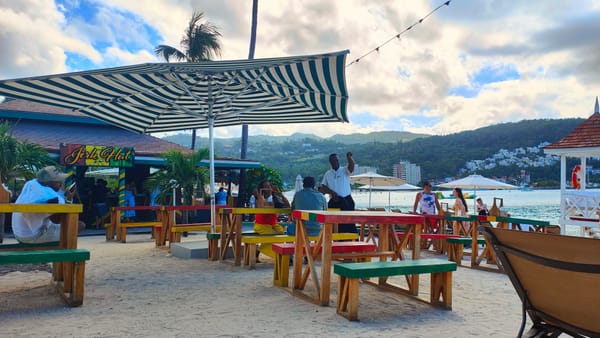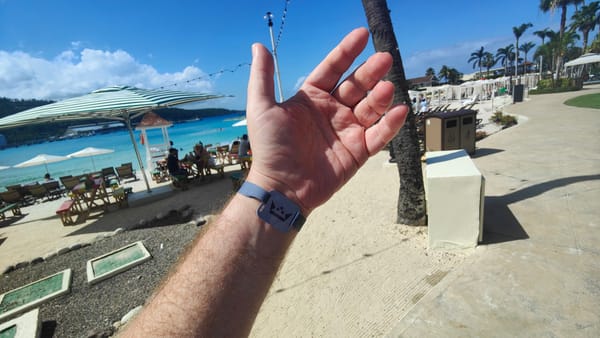Finding Strength in Boundaries: Moving Forward After the Election

Writing is part of my grieving process, as it is for many of us who make sense of our feelings by putting them into words. So today, I’m writing because I need to sort through this, to give myself a little space to understand where we go from here.
Watching the election results last night was a slow, quiet heartbreak. And even though I had tried to mentally prepare myself, hoping not to be blindsided, the sting is still there. Like many of you, I’ve felt the exhaustion of these political cycles, and this one left a distinct heaviness. Even though I wasn’t swept up in the initial enthusiasm when Kamala Harris took Biden’s place, I understood the necessity of her candidacy. I knew her campaign was an uphill battle, yet it felt important to vote for her.
It’s tempting to sit here analyzing every angle of where things went wrong, but I think my energy—and maybe yours, too—would be better spent on how we move forward in our personal lives. We are each processing different feelings—frustration, hopelessness, anger, maybe even disbelief. It’s hard to imagine a clear path right now, but here’s what I plan to do as personal coping mechanisms. Maybe some of these ideas will resonate with you, too.
Focus on Your Personal Care
There’s no denying this election cycle took its toll mentally, and it’s time to prioritize ourselves. Self-care might sound like a buzzword, but it’s really just about being better to ourselves in ways that genuinely nourish us. For me, that’s going to mean eating better, logging off for longer stretches, moving more, and spending time with people who actually make me feel good. I think we need to find joy and build spaces that feel safe and fulfilling because, honestly, we deserve it. These steps are about protecting our peace and strength, so we’re better equipped to handle what comes.
Impose Psychological Boundaries
A colleague once told me that we can’t worry about everything—we have to focus on what we can control. And while it seems simple, it’s been a hard-won lesson to let go of worrying about everything wrong with the world. We voted, we made our voices heard, and it didn’t end up the way we wanted. But now, we can center our energy on what we can change: our work, our families, and how we live each day. Sure, this outcome may affect some things, but obsessing over it won’t serve us. I’m trying to shift my focus to what’s in my reach—those 100-foot issues, rather than the 10,000-foot ones. Taking breaks from the news cycle can also help. If it feels overwhelming, remember it’s okay to unplug for a while.
Impose Social Boundaries
This one’s tough because it can feel like we’re closing doors. But I’ve realized that we don’t owe anyone access to our time or energy, especially if their presence feels damaging. I want to spend time with positive and encouraging people, not those who drain me with antagonism or bitterness. I know many of you have had to set boundaries these past years, especially as political divides have deepened. With this new political climate, many of these same people may feel even more emboldened. But I believe we can choose how we engage. Friends, family, lifelong acquaintances—some of them may just need to live outside my immediate world for now, and that’s okay. If setting boundaries protects our peace, it’s worth it.
Set Media Boundaries
The news cycle today is relentless. To maintain mental peace, we must set boundaries around how and when we consume media. I’ve decided to limit my news intake to specific times of the day rather than staying tuned in 24/7. This small step means I’m not overwhelmed by each update or alert. If you feel constantly on edge, consider limiting your media time—give yourself the space to process instead of consuming news around the clock.
Impose Digital Boundaries
Not every interaction needs to be digital, nor do we need to be constantly accessible. While social networks can bring connection, they can also pull us into unnecessary debates or drain us with negativity. I’ve decided to leave X (formerly Twitter) due to its increasing toxicity. Going forward, I’ll use platforms like Bluesky, Mastodon, and Threads to engage in a healthier, more controlled environment. If someone’s views feel intractable or incompatible with my own, I’ve learned to block first and block often rather than engage in sustained arguments. I’m setting clear limits on my online interactions, making time for in-person connections or meaningful online interactions that genuinely add value. Choosing to disengage digitally is one of the simplest ways I’m protecting my peace right now.
Impose Emotional Boundaries
It’s easy to get emotionally overwhelmed by others’ feelings, especially when tensions are high. Emotional boundaries remind me that I don’t need to take on everyone’s pain or opinions as my own. I’m allowing myself to hold space for my feelings and process them fully, while learning to support others without absorbing every emotion around me. This boundary is helping me stay balanced when emotions run high.
Impose Professional Boundaries
Unlike friends or family, we don’t always get to choose who we work with. But we can control how we interact. I know that toxicity may become more normalized in some workplaces, and it’s a reality I’m preparing for. If there’s an option to work somewhere with a healthier environment, I’ll take it. Otherwise, I’ll stay professional and limit my conversations on sensitive issues. I’ll focus on being a positive resource, helping those who want to do a good job, and keeping things strictly business with those who don’t. Toxicity may be harder to avoid in certain spaces, but we don’t have to let it consume us.
Boundaries Around Volunteering and Activism
The desire to make a difference can feel urgent in times of great change. But I’m learning that sustainable action means setting limits. I want to support causes that matter to me, but I know I can’t do it all, nor should I try to. I’m focusing my time and energy on causes where I can make a meaningful impact while preserving my mental and emotional health.
Impose Financial Boundaries
Financial decisions are also a form of quiet protest. By supporting businesses and causes that align with our values, we can have a positive impact without confrontation. I’m setting a financial boundary to only support businesses that reflect my beliefs, avoiding those that don’t. In my writing, whether on technology or food, I won’t elevate businesses that don’t align with my values. These quiet decisions help me live in alignment with what I believe.
Set Time Boundaries
Giving too much time to divisive topics can lead to overwhelming anxiety. I’m learning to protect my time by focusing on things that truly bring me fulfillment and positivity. By setting limits on how much time I spend discussing or thinking about political topics, I can direct my energy toward building a better personal life and supporting my immediate community.
Seek Out Community
We’re not alone, even when it feels that way. I know the feeling of looking around and seeing division, but there are still people who share our values. I plan to seek spaces, whether online or in-person, where I can connect with people who understand. There’s real strength in solidarity, and being with like-minded people reminds us that we’re part of something bigger. Even the smallest communities can offer comfort, understanding, and the courage to keep moving forward.
Final Thoughts: Moving Forward, with Purpose
These aren’t grand gestures, and they aren’t solutions to the world’s problems. But they’re things we can do for ourselves. They’re boundaries we can set to keep our energy intact. From there, we can think about other ways to engage in the bigger issues, whether through volunteering, community organizing, or supporting causes that matter to us. But first, we have to prioritize our own peace and strength.
As we protect our mental space and foster healthier boundaries, we create a foundation for change, even if it’s on a smaller, personal scale. Together, these small acts of resilience can make a difference, whether we see it now or not. And as Maya Angelou said in Letter to my Daughter, “You may not control all the events that happen to you, but you can decide not to be reduced by them.” When we invest in our own well-being, we’re stronger and more capable of making a positive impact.
Taking care of ourselves is not retreating—it’s building a foundation. We’re each stronger when we’re clear-headed and centered. And that’s the best way, I believe, to move forward constructively and maybe make a difference.



